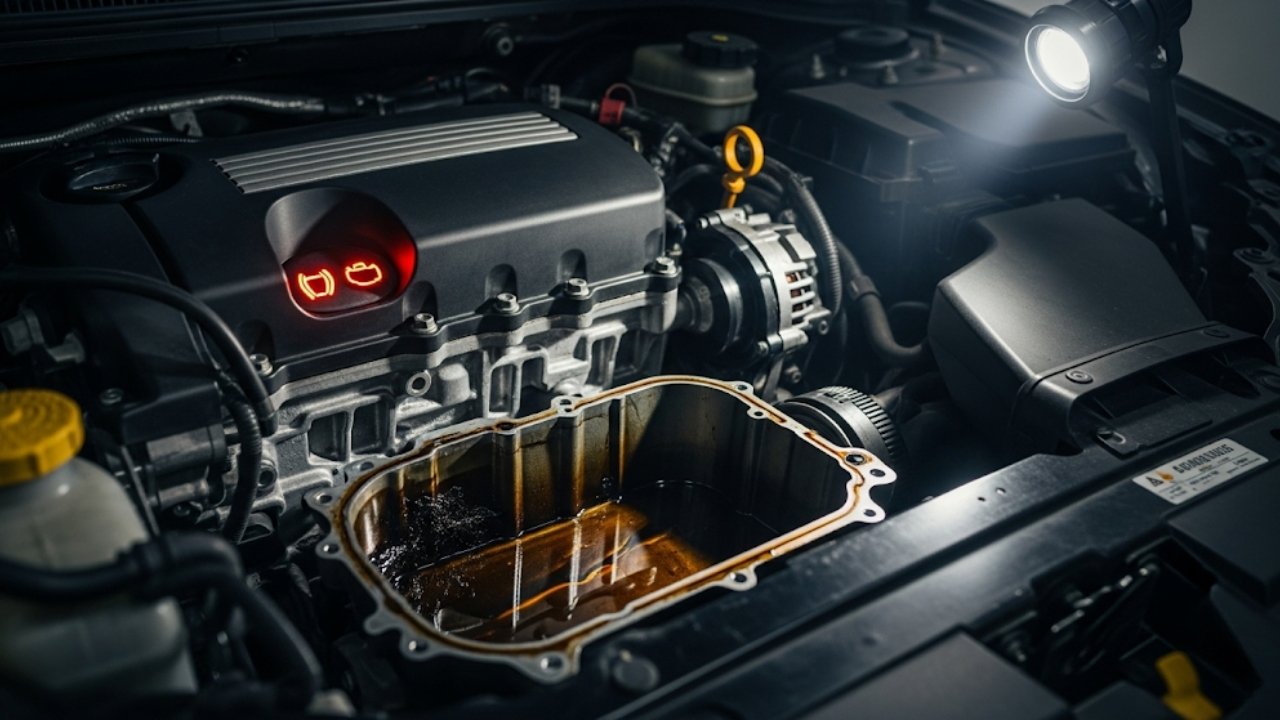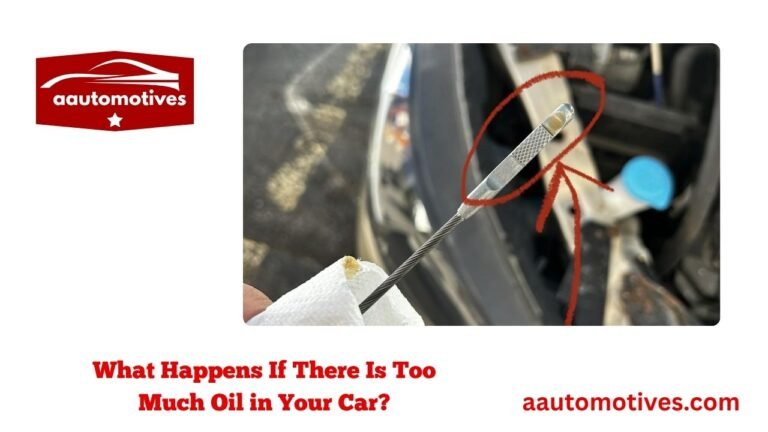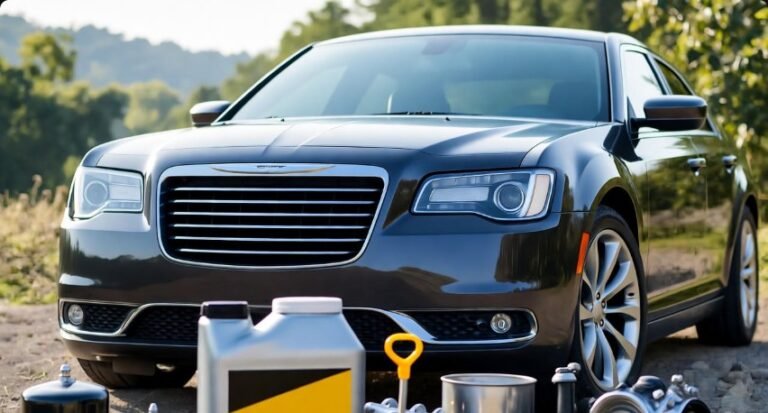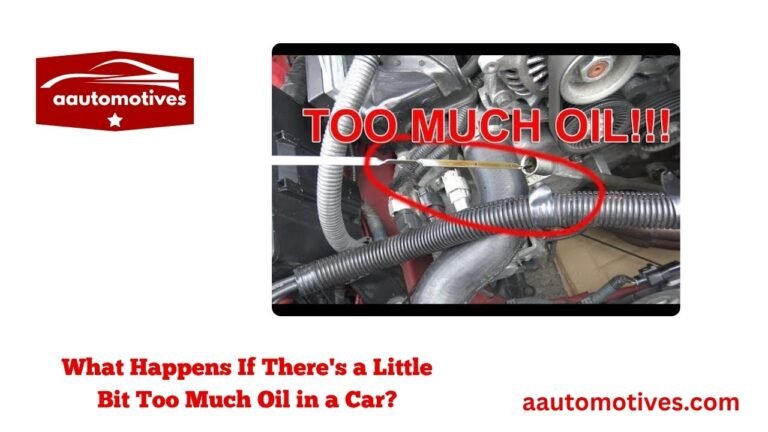What Happens When Oil Runs Out in a Car

You ever have one of those days where everything’s running smoothly—until it isn’t? That’s how I learned what happens when oil runs out in a car. One minute I’m cruising to work, coffee in hand, favorite playlist on. The next, the oil warning light starts blinking like a warning from the universe. I ignored it. Big mistake.
Within minutes, my engine sounded like it was grinding coffee beans. It stalled. I sat there in silence, the reality slowly sinking in. Running out of oil in a car isn’t just a small hiccup. It’s like asking your heart to pump with no blood. And the consequences? They’re brutal.
This guide is for everyone who’s ever overlooked that little red oil can symbol. We’re diving into what happens when oil runs out in a car, how you can spot it early, and—most importantly—how to avoid a breakdown that could break your wallet.
In This Article
- 1 Why Engine Oil Is Like a Car’s Lifeblood
- 2 What Happens When Oil Runs Out in a Car: A Step-by-Step Catastrophe
- 3 How Long Can a Car Run Without Oil Before Damage Occurs?
- 4 Real Talk: My Personal Experience With Oil Loss
- 5 Early Symptoms of Low or No Oil in a Car
- 6 What Causes a Car to Run Out of Oil?
- 7 Damage Checklist: What Parts Get Ruined When Oil Runs Out
- 8 How Mechanics Diagnose Oil-Starvation Damage
- 9 Can an Engine Recover After Running Out of Oil?
- 10 How to Check and Maintain Your Car’s Oil Like a Pro
- 11 How Much Does It Cost to Fix an Engine That Ran Out of Oil?
- 12 Tips to Never Run Out of Oil Again
- 13 FAQs About Running Out of Oil in a Car
- 13.1 1. Can I drive with low oil just for a few miles?
- 13.2 2. What should I do if my oil light comes on?
- 13.3 3. Can synthetic oil prevent engine failure if oil runs low?
- 13.4 4. Why is my car burning oil so quickly?
- 13.5 5. Will insurance cover engine damage from no oil?
- 13.6 6. Is it normal for old cars to burn oil?
- 13.7 7. What if I accidentally overfill my oil?
- 13.8 8. Does oil go bad if I don’t drive much?
- 14 Final Thoughts: Oil Isn’t Just a Maintenance Task—It’s a Lifeline
Why Engine Oil Is Like a Car’s Lifeblood

-
Lubrication: Keeps metal parts from grinding together.
-
Cooling: Draws heat away from friction-heavy zones.
-
Cleaning: Carries away gunk, dirt, and combustion leftovers.
-
Sealing: Helps seal the gap between pistons and cylinder walls.
-
Protection: Prevents rust and corrosion inside the engine.
Without oil, your car’s engine becomes a ticking time bomb.
What Happens When Oil Runs Out in a Car: A Step-by-Step Catastrophe
Let’s walk through what actually happens when your engine is starved of oil. It’s not a single moment—it’s a chain reaction. And once it starts, you can’t stop it without damage.
1. Warning Lights Begin to Blink
You’ll usually see the oil pressure light on your dashboard. It looks like a tiny oil can. Ignore it, and you’re gambling with your engine’s life.
2. Engine Heat Skyrockets
With no oil, there’s no cooling. Temperatures soar. Your engine starts cooking itself from the inside. Not a good time for a road trip.
3. Strange Noises Start
Ticking. Knocking. Grinding. These aren’t good sounds. They’re signs of metal-on-metal contact—causing irreversible damage.
4. Loss of Power
Your car will struggle to move. It may hesitate, shudder, or lose acceleration. This is your engine gasping for air.
5. Complete Engine Seizure
Eventually, the engine seizes. This means the parts are so damaged they can’t move anymore. You’ll be left stranded, needing a full engine replacement.
Pro Tip: If you ever see the oil light come on, stop driving immediately. Pull over. Check your oil level. Save your engine before it’s too late.
How Long Can a Car Run Without Oil Before Damage Occurs?
Not long. Some people think they can coast to the next gas station, but even a few minutes without oil can cause lasting damage.
| Time Without Oil | Potential Damage |
|---|---|
| 1–2 minutes | Minor wear begins |
| 3–5 minutes | Overheating, knocking |
| 6–10 minutes | Engine parts warp or seize |
| 10+ minutes | Total engine failure |
In short? The moment you run out of oil, the countdown begins.
Real Talk: My Personal Experience With Oil Loss
I once drove an old Toyota that burned oil like crazy. I thought topping it up every month was enough. Until one day, I forgot. Within 15 minutes of ignoring the oil light, my engine coughed and died. Mechanic said I needed a full engine rebuild. Cost me more than the car was worth.
Lesson? Never underestimate the damage caused by running out of oil. Prevention is way cheaper than repairs.
Early Symptoms of Low or No Oil in a Car
Want to avoid a catastrophe? Pay attention to these signs:
-
Dashboard warning light
-
Burning oil smell
-
Overheating engine
-
Ticking or knocking noises
-
Rough idling or stalling
-
Visible oil leak under the car
If you notice any of these, check your oil immediately.
What Causes a Car to Run Out of Oil?
It’s not always neglect. Sometimes, your car is losing oil without you even knowing. Here’s why it might happen:
-
Oil Leaks: From worn-out gaskets or seals.
-
Oil Burning: Common in older engines.
-
Faulty Oil Filter: May not trap particles, leading to oil degradation.
-
Neglected Maintenance: Not changing oil at the recommended intervals.
-
Faulty PCV Valve: Causes oil to be sucked into the engine and burned.
Knowing the causes helps you prevent future problems.
Damage Checklist: What Parts Get Ruined When Oil Runs Out
When the oil runs dry, damage spreads like wildfire. Here are the most common victims:
-
Camshaft and crankshaft bearings
-
Piston rings
-
Cylinder walls
-
Turbocharger (if applicable)
-
Timing chain
-
Oil pump (ironically)
Each of these parts is expensive to replace. And if multiple fail? You’re looking at a new engine—or a new car.
How Mechanics Diagnose Oil-Starvation Damage
Mechanics use a few tricks to diagnose oil-related engine failure:
-
Check for lack of oil on dipstick
-
Listen for internal knocking
-
Inspect piston/cylinder walls with a borescope
-
Look for scorched or discolored parts
-
Metal shavings in the oil pan
A proper inspection can confirm if the damage was caused by oil starvation or something else.
Can an Engine Recover After Running Out of Oil?
Yes and no. If you catch it early—like within a minute or two—you might escape with minor damage. A full oil change and filter replacement may be enough.
But if the engine starts knocking or seizing, recovery is unlikely without major repair. In most cases, you’ll need a rebuild or replacement.
How to Check and Maintain Your Car’s Oil Like a Pro
Preventing oil starvation is easy. You don’t need to be a mechanic. Just follow these steps and you’ll avoid big trouble.
How to Check Engine Oil:
-
Turn off your car and let it cool.
Checking hot oil can give inaccurate readings—or burn you. -
Pop the hood and find the dipstick.
Usually a yellow or orange ring. -
Pull it out, wipe clean, reinsert, then pull again.
This shows you the true oil level. -
Check the oil color and level.
-
Light brown = good.
-
Dark/black = dirty, time for a change.
-
Foamy = contamination, get it checked.
-
-
Top up if it’s low.
Use the manufacturer-recommended oil grade. Don’t guess.
How Often to Check and Change Oil:
| Driving Conditions | Check Oil Every | Change Oil Every |
|---|---|---|
| City Driving | 2 Weeks | 3,000–5,000 miles |
| Highway Driving | Monthly | 5,000–7,500 miles |
| Extreme Weather/Towing | Weekly | 3,000–5,000 miles |
Keeping up with oil checks is like brushing your teeth—it saves you pain (and money) later.
How Much Does It Cost to Fix an Engine That Ran Out of Oil?
The price tag isn’t pretty.
| Damage Type | Estimated Cost |
|---|---|
| Minor Parts (gaskets, sensors) | $200–$600 |
| Piston/Cylinder Repair | $1,000–$2,500 |
| Engine Rebuild | $2,500–$4,000 |
| Engine Replacement | $4,000–$7,000+ |
Let that sink in. A $30 oil change could save you from a $5,000 disaster.
Tips to Never Run Out of Oil Again
This might sound obvious, but when life gets busy, we forget. So here’s a simple plan:
-
Set oil change reminders on your phone.
-
Use apps like CarFax or Drivvo to track oil maintenance.
-
Check oil every other time you get gas.
-
Keep a spare quart of oil in your trunk.
-
Get regular inspections—especially before road trips.
A few minutes of effort can save you weeks of frustration.
FAQs About Running Out of Oil in a Car
1. Can I drive with low oil just for a few miles?
Technically, yes. But it’s risky. Even a short trip with very low oil can cause serious engine wear or overheating. Don’t chance it.
2. What should I do if my oil light comes on?
Stop as soon as it’s safe. Turn off the engine. Check your oil level. If it’s empty, don’t restart the car. Call for help or add oil immediately.
3. Can synthetic oil prevent engine failure if oil runs low?
No. Synthetic oil has better properties, but it still needs to be present. If it runs out, it can’t protect your engine either.
4. Why is my car burning oil so quickly?
Common reasons include:
-
Worn piston rings
-
Bad valve seals
-
PCV valve issues
-
Oil leaks
Get your engine inspected to avoid bigger problems.
5. Will insurance cover engine damage from no oil?
Usually not. Most insurance policies see it as owner neglect. Regular maintenance is your responsibility. Extended warranties might help—but read the fine print.
6. Is it normal for old cars to burn oil?
Yes, especially if they have 100,000+ miles. Just check oil more often and top up as needed. It’s manageable with regular care.
7. What if I accidentally overfill my oil?
Too much oil can also cause engine damage. It leads to frothy oil, poor lubrication, and even blown seals. Drain the excess or visit a mechanic.
8. Does oil go bad if I don’t drive much?
Yes. Oil degrades over time. Even if you don’t hit mileage limits, change it at least every 6–12 months.
Final Thoughts: Oil Isn’t Just a Maintenance Task—It’s a Lifeline
If there’s one thing I’ve learned from my breakdown experience, it’s this:
Neglecting oil is like ignoring your heartbeat.
When oil runs out in a car, it’s not just about inconvenience. It’s about total loss. Engines are the heart of your vehicle. And oil is the blood that keeps it alive.
So next time that little oil light blinks, treat it like an SOS. Pull over. Pop the hood. Give your car the love it deserves. Because a $5 bottle of oil might be the best insurance you’ll ever buy.






